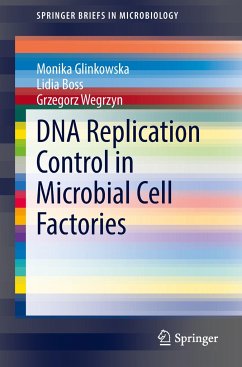This work describes the current knowledge of biochemical mechanisms regulating initiation of DNA replication in Escherichia coli, which focuses on the control of activity of the DnaA protein. Examples of direct linkages between DNA replication and other cellular processes are provided. In addition, similarities of the mechanisms of regulation of DNA replication operating in prokaryotic and eukaryotic cells are identified, and implications for understanding more complex processes, like carcinogenesis are suggested.
Studies of recent years provided evidence that regulation of DNA replication in bacteria is more complex than previously anticipated. Multiple layers of control seem to ensure coordination of this process with the increase of cellular mass and the division cycle. Metabolic processes and membrane composition may serve as points where integration of genome replication with growth conditions occurs. It is also likely that coupling of DNA synthesis with cellular metabolism may involve interactions of replication proteins with other macromolecular complexes, responsible for various cellular processes. Thus, the exact set of factors participating in triggering the replication initiation may differ depending on growth conditions. Therefore, understanding the regulation of DNA duplication requires placing this process in the context of the current knowledge on bacterial metabolism, as well as cellular and chromosomal structure. Moreover, in both Escherichia coli and eukaryotic cells, replication initiator proteins were shown to play other roles in addition to driving the assembly of replication complexes, which constitutes another, yet not sufficiently understood, layer of coordinating DNA replication with the cellcycle.
Hinweis: Dieser Artikel kann nur an eine deutsche Lieferadresse ausgeliefert werden.
Studies of recent years provided evidence that regulation of DNA replication in bacteria is more complex than previously anticipated. Multiple layers of control seem to ensure coordination of this process with the increase of cellular mass and the division cycle. Metabolic processes and membrane composition may serve as points where integration of genome replication with growth conditions occurs. It is also likely that coupling of DNA synthesis with cellular metabolism may involve interactions of replication proteins with other macromolecular complexes, responsible for various cellular processes. Thus, the exact set of factors participating in triggering the replication initiation may differ depending on growth conditions. Therefore, understanding the regulation of DNA duplication requires placing this process in the context of the current knowledge on bacterial metabolism, as well as cellular and chromosomal structure. Moreover, in both Escherichia coli and eukaryotic cells, replication initiator proteins were shown to play other roles in addition to driving the assembly of replication complexes, which constitutes another, yet not sufficiently understood, layer of coordinating DNA replication with the cellcycle.
Hinweis: Dieser Artikel kann nur an eine deutsche Lieferadresse ausgeliefert werden.








